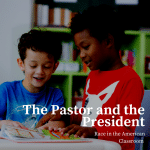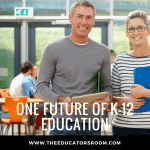By Guest Writer Melissa Kandido
Melissa Kandido teaches IB Art, IB History, IB English, & IB Geography for middle and upper grades at the Windhoek International School in Windhoek, Namibia. She is sharing with us her experiences and adventures this year as an international educator and IB teacher.
Joining a school community from a point that is not the beginning of the year is difficult. Getting acclimated to the electronic 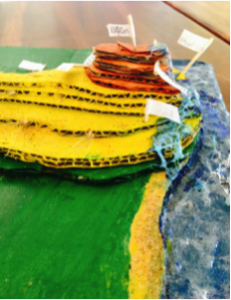 platforms of communication is daunting. Navigating through the where-to-get-what-and-from-whom-and when type of logistics is also a challenge. I am now using Edmodo, Managebac, and D6 to communicate with students and parents rather than Infinite Campus and FirstClass. Then there is the “feeling lost” at all times scenario. The campus seems winding and where meetings are in relation to my classrooms is a wandering and wondering walk through how-to-get-there land. I also am in full observation mode when trying to assess the best modes of communication with colleagues.
platforms of communication is daunting. Navigating through the where-to-get-what-and-from-whom-and when type of logistics is also a challenge. I am now using Edmodo, Managebac, and D6 to communicate with students and parents rather than Infinite Campus and FirstClass. Then there is the “feeling lost” at all times scenario. The campus seems winding and where meetings are in relation to my classrooms is a wandering and wondering walk through how-to-get-there land. I also am in full observation mode when trying to assess the best modes of communication with colleagues.
Flexing your mind muscles as well as being humbled into being the “new” teacher is a lesson in and of itself. Having multiple ideas for lesson planning and projects but not knowing if the materials are available nor if they fit into the IGCSE curriculum focii is something that causes me to take pause (which I don’t do well nor often.) However, my feet are becoming more grounded and things are starting to gel. I am feeling my teacher flow and have students who explore their academics with politeness and fervor. I will share two recent lessons, one for IB art 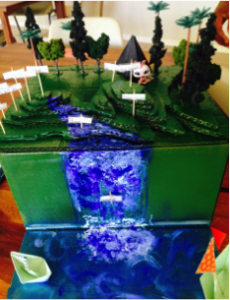 and one for Year 9 Geography.
and one for Year 9 Geography.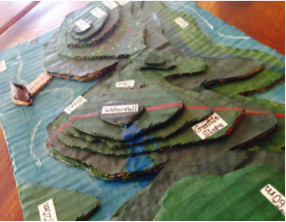
In Year 9 Geography, they explored maps–reading them, bearings, and contour lines. The created contour models from maps and their results were stunning. They were required to label elevation, steep and gentle slopes, and have various landforms. Transferring the knowledge from a 2D paper map of contour lines to a 3D cardboard model can be challenging. I supplied box cutters and boxes and they brought the rest of their supplies. They helped each other and worked in class diligently. They self-assessed on rubrics and most did quite well.
Many asked if they could create their own contour map and model based off of it (because I provided one for them to use as a jumping off point.) Others asked about a volcano, and if the many added features would help their grade. Explaining that additional pieces may help but that the basics must be there; that the correctness of the model must be the basis on 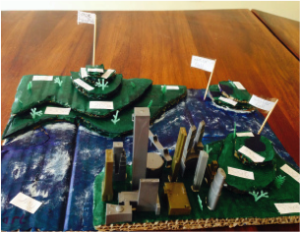 which they build was something I had to reiterate. Allowing them to be creative on top of the basic knowledge–that is the part I love. Helping them find ways to create landscape out of Qtips or paper or found objects is better than buying things.
which they build was something I had to reiterate. Allowing them to be creative on top of the basic knowledge–that is the part I love. Helping them find ways to create landscape out of Qtips or paper or found objects is better than buying things.
I had a student who was working independently and struggling. He was receptive to my help, but also from his classmates. This student is the kind who portrays his nonchalance towards academics yet applies himself when it is hands-on. His classmate, once she had completed her model, spent time with him as his ad-hoc partner to complete his model. I stepped back in appreciation for cooperative efforts as well as the giving of helping hands–after all, she could have sat back and enjoyed her free time because she was finished.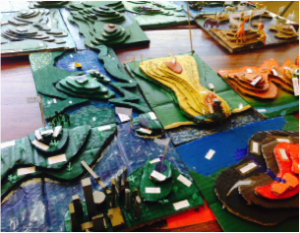
Seeing students as full-fledged humans is key for me. She is not going to make the world a better place ‘when she grows up’ but she is doing so now. They make the world a better place by participating fully in their environment. She is a quiet person who recognized her classmates’ struggle. I didn’t ask her to help and he didn’t ask for her help; she did so on her own volition. (on a complete side note, this 14 year old student was recently selected by the Under 19 Namibian In-Line Hockey Team to represent his country in Argentina next June! I am so happy for him–how cool?!) Pictures of their work seem to tell the story better.



